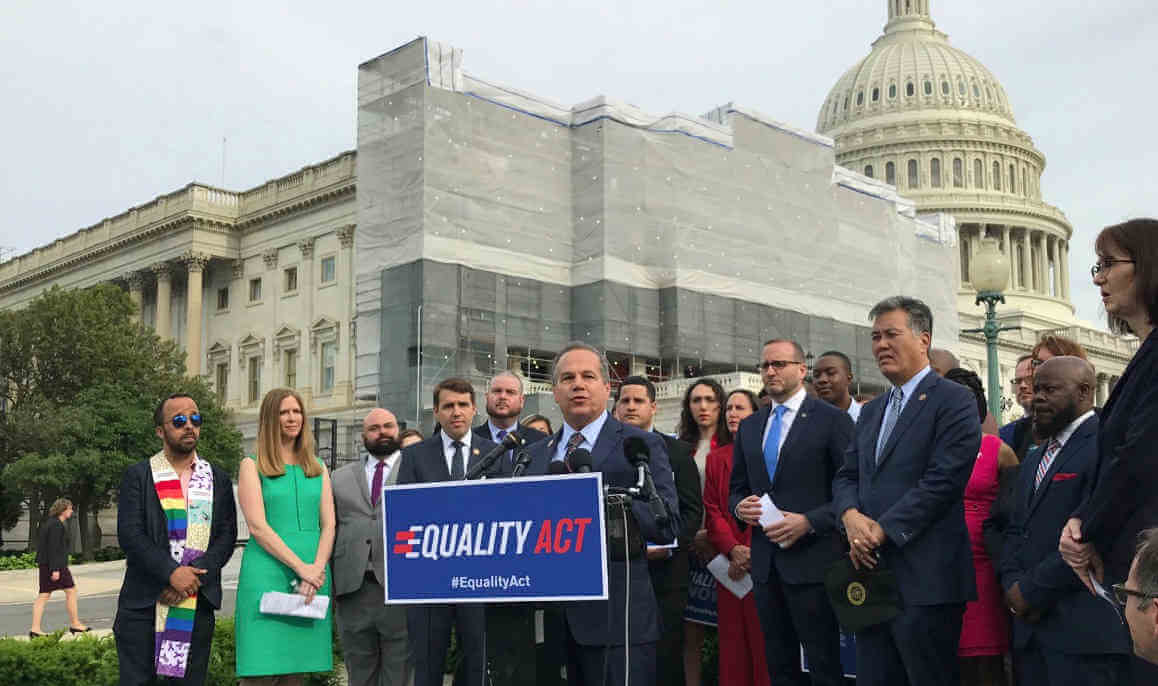In an historic step forward for LGBTQ rights, the House of Representatives on May 17 easily passed the Equality Act, a measure that would amend the 1964 Civil Rights Act and related federal laws to ban discrimination on the basis of sexual orientation and gender identity.
The bill passed with 236 votes in favor — including eight Republicans — and 173 votes against, marking the first time it cleared either chamber of Congress since its original introduction in 2015. Every no vote was cast by a Republican.
The measure now advances to the GOP-controlled Senate, where it is expected to stall, and President Donald Trump has already signaled his opposition. But advocates hope its passage in the lower chamber can inject momentum into the future prospects for a bill that is widely supported by Americans nationwide.
“Equal treatment under the law and a commitment to fairness and equality are founding values of our country,” said David Cicilline, an out gay Rhode Island Democratic congressmember who carried the bill in the House. “Discrimination of any kind is wrong, and no one should ever be treated as less than equal because of who they are or who they love.”
The Equality Act would enshrine protections for millions of Americans who live in the more than two-dozen states where it is still legal to discriminate against people on the basis of sexual orientation or gender identity, and it would cover a wide range of areas: housing, employment, public education, public accommodations, federal funding, credit, and in the jury system.
Republican congressmembers who voted in favor of the bill were Susan Brooks of Indiana, Mario Díaz-Balart of Florida, Brian Fitzpatrick of Pennsylvania, Will Hurd of Texas, Greg Walden of Oregon, and three lawmakers from upstate New York: John Katko, who represents the Finger Lakes region encompassing Syracuse; Tom Reed, whose wide-ranging district covers the progressive area of Ithaca and extends to the western border of the state; and Elise Stefanik of northern New York along the Canadian border.
Seven Democrats and 16 Republicans did not cast a vote. Congressmember Max Rose, who represents Staten Island and a slice of southwestern Brooklyn, co-sponsored the bill but was unable to vote because he had to return to New York for a funeral. A spokesperson for Rose told Gay City News that the congressmember plans to note in the Congressional Record that he would have voted yes. Every other member of the New York City delegation voted in support of the bill.
During a debate ahead of the vote, Democrats delivered strong and sometimes emotional speeches in favor of the bill, while several Republicans employed oft-used tactics in opposition to it, saying it would harm religious freedom and women’s rights. In an example of the nonsensical rhetoric spewed by the GOP’s conservative wing, Representative Tom McClintock of California — who was born in White Plains, New York — said the bill would destroy “safe spaces for women,” an apparent reference to baseless hysteria driving the opposition to the right of people to use bathrooms aligned with their gender identity. He added that it would target “women-owned businesses.”
Republican Congressmember Ross Spano of Florida argued that the bill would be an attack on freedom and that it would expose religious groups to future lawsuits.
A broad coalition of Democrats vociferously defended the Equality Act. Out gay Representative Mark Pocan of Wisconsin said the bill would allow him to move with his husband anywhere in the country, while longtime civil rights leader John Lewis of Georgia said it would help pave the way to “end discrimination in this country and set our people free.”
Brooklyn and Queens Representative Hakeem Jeffries said, “If you truly believe in liberty and justice for all, support the Equality Act… Love does not discriminate and neither should the law.”
GOP members of the House also made one last-ditch effort to stifle the vote by unsuccessfully calling for a “motion to recommit,” which would give lawmakers one last chance to amend the bill before it a final vote. Lawmakers then proceeded to the final vote.
The final vote on the Equality Act came roughly two weeks after the House Judiciary Committee passed the bill in a party line vote. Republicans obstructed the committee at the time by forcing the clerk to read the entire 27-page bill before the vote. Republicans used hearings ahead of that vote to unleash homophobic and transphobic rhetoric laced with false conspiracy theories about how the bill would, in the words of Representative Louie Gohmert of Texas, “be used as a sword to strike down our religious freedoms.”
The Equality Act had its earliest expression in New York City, where Congressmembers Ed Koch and Bella Abzug joined forces in 1974 to propose a similar amendment to the 1964 Civil Rights Act in the House of Representatives. That bill only included protections on the basis of sexual orientation, sex, and marital status.
A far narrower measure, the Employment Non-Discrimination Act (ENDA), cleared the House of Representatives and the Senate in separate years but never passed both houses in the same session of Congress. That measure faced intense debate over the decision to include protections for transgender and gender non-conforming people, with the House version dropping those protections but the Senate in a later session incorporating them.



































